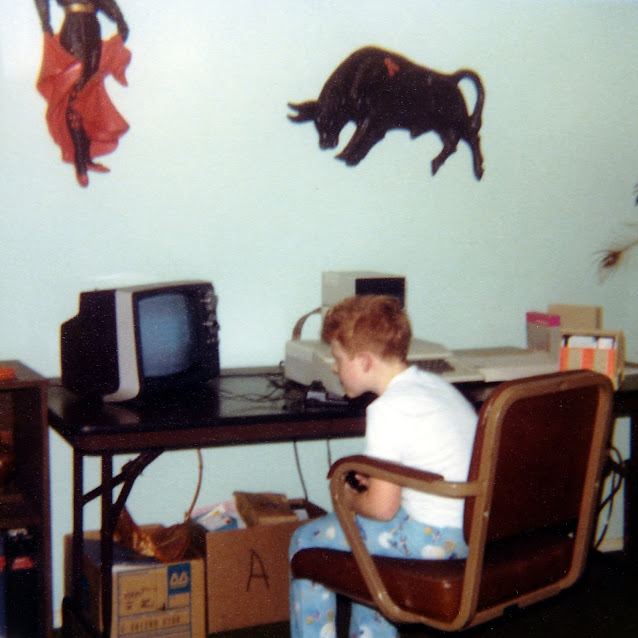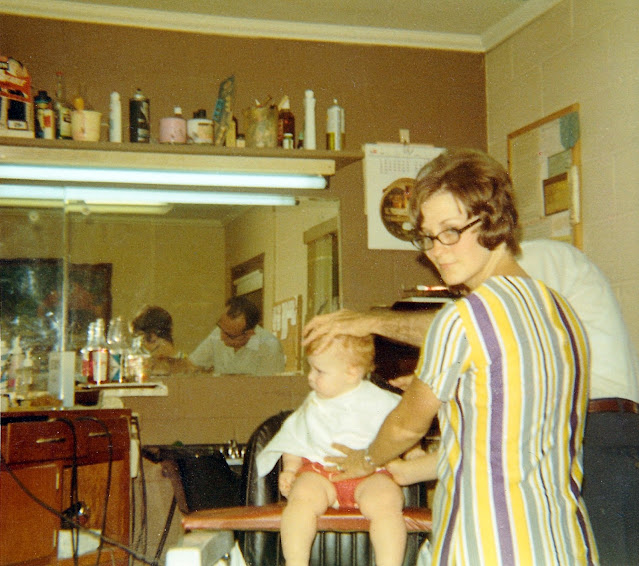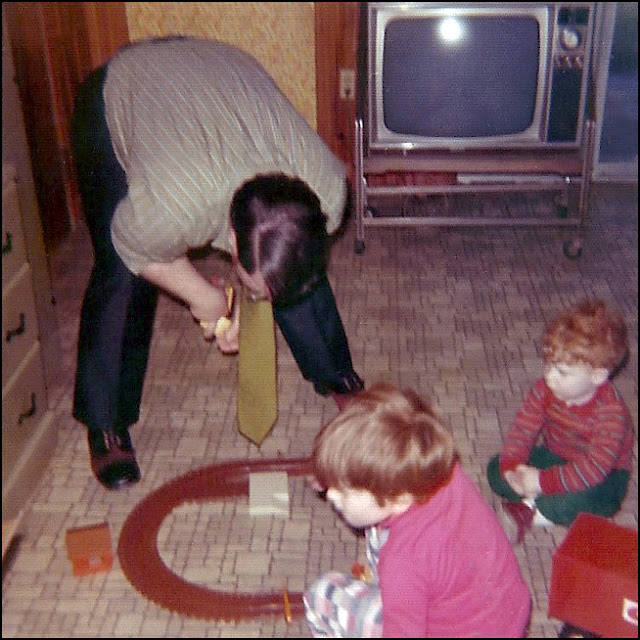 |
| My brother, Jeff, playing a game on our Apple II home computer in the early 1980s |
My first computer was a 1980 Apple II that Dad bought for us, back when he worked for a local computer store that was an Apple dealer (in addition to selling Compaq and Kaypro, and some other brands that are no longer around -- Apple obviously is). This distinction probably isn't something many people these days would recognize as important, but it was an Apple II -- not an Apple II+ or an Apple IIe, and certainly not an Apple IIc -- that model didn't come out until a few years later.
No, it was just a plain old Apple II; for a monitor you connected it to a TV set via an RF modulator, its character set didn't include lower-case letters, and it had to go into a different mode to display graphics than it used to display text. The Apple II did have color, though, which set it apart from many of the other home computers around at that time, but since we used an old black and white TV as our monitor, we couldn't tell the difference: the frogs in Frogger were a light gray to us.
But even if we were watching grayscale frogs hop across grayscale traffic to hop onto the backs of grayscale alligators, we at least had a computer, which was not true of very many families back at the end of the 1970s and beginning of the 1980s.
Yes, it was a computer, at least technically, but it was nothing like the ones we're used to today. In those days 64KB of RAM -- not 64MB, and definitely not 64GB -- was a lot. In fact, I think we started with just 4K (back then you didn't indicate the B; I guess "bytes" was understood) and worked our way up by taking the cover off and plugging RAM chips into the available slots. For the first year or two, we read programs into that memory from a cassette drive, but Dad eventually (perhaps fairly quickly, I really don't remember the exact timeline of all this) brought home a floppy disk drive, and then another, making it much faster for us to boot up Space Invaders or Frogger or whatever game we felt like playing. (These were 5 1/4 -- pronounced "five and a quarter" -- inch floppy drives and disks, by the way, and they held something like 512K per side, which at the time really was a lot.)
Games were mostly what we used the Apple II for: the already-mentioned Space Invaders and Frogger, Lemonade Stand, and quite a few I'm sure I've forgotten. In the picture above, Jeff is playing one of these games, probably Space Invaders, holding the paddle in his lap (the Apple had a dedicated port for paddles, I imagine because games like those were probably its most common use).
I made grand plans when I learned we were going to be getting the computer but didn't yet have it, back in sixth grade, of becoming a programming whiz and creating a computerized version of Monopoly (and possibly getting rich and famous, though I don't think I actually thought about that possibility very much). I would pore over the pamphlets and manuals (Dad managed to bring home a copy of a manual before we got the actual computer) and scheme and fantasize and dream.
Scheme and fantasize and dream, but not do any real planning, other than a few inept sketches of what the screen should look like, and I never wrote even a single line of code for my Monopoly game. I did become a decent BASIC programmer, though, and I did write a game that involved guns you would move around with your paddle, and bullets that could either take out the other gun, or disappear into the cactus in the middle of the screen (it was my sole gimmick, in this game at least) only to be shot out again from the cactus in some new, randomly-chosen direction. I also wrote a program that drew letters on the screen, creating a lower-case character set the computer then lacked. (It couldn't save what you wrote, though -- I didn't know how to make it do that -- so it was not a "word processor" or "text editor" by any stretch of the imagination.) And when I was taking chemistry at Berkmar (in 11th or 12th grade, 1984 or 1985; I don't remember, but I do remember that the teacher was Mrs. East -- actually Dr. East, I believe; I think she did have a Ph.D., but she didn't go by "Dr."), my science fair proposal was a computer-based study program called Computer Tutor, which I actually did do a lot of work on, but which I never actually finished, just as a I didn't finish chemistry. (Dropping out of one made it easy for me to abandon the other.)
When I was in ninth grade at Berkmar, taking Coach Thees's Algebra class, there was a tenth grader in my class who I would talk to sometimes about music (he was into synthesizers and liked Gary Newman) and computers (he also had an Apple II); his name was Jeff Martin. At one point he gave me a floppy disk containing a pirated version of SirTech's landmark fantasy roleplaying game Wizardry. It was a strangely defining moment for me -- I already loved fantasy fiction, and I soon loved this game. I didn't have a manual or any instructions, but by trial and error I learned how to play, and eventually got my cousin Scott and my brother Jeff into it with me, in long Friday night adventuring campaigns with our party of Srizaxa, Sribob, Imok (so named when we saw the spine of I'm OK, You're OK on Dad's bookshelf), and at least three others whose names now escape me. (A full party in Wizardry was six characters, and we always played with a full party.).
The last thing I'm going to say -- for now, at least -- about this phase of my life is that we subscribed to Creative Computing, a magazine I dearly loved and read faithfully every month. I also looked through the ads in the back many times, fantasizing about the computers I would get and what cool things I would do with them.
Today, computers are all around us, powering or enabling an awful lot of what we do, and we tend to take them for granted. I wrote much of this musing on my Google Pixel 3a smart phone using an Anker bluetooth keyboard, and, except while composing this sentence, it doesn't even occur to me what a cool thing it is that I have these tools at my disposal. I am glad, though, that I have memories of a time when personal computers were unique and not yet ubiquitous, and back then I think I really did realize how cool they were.























